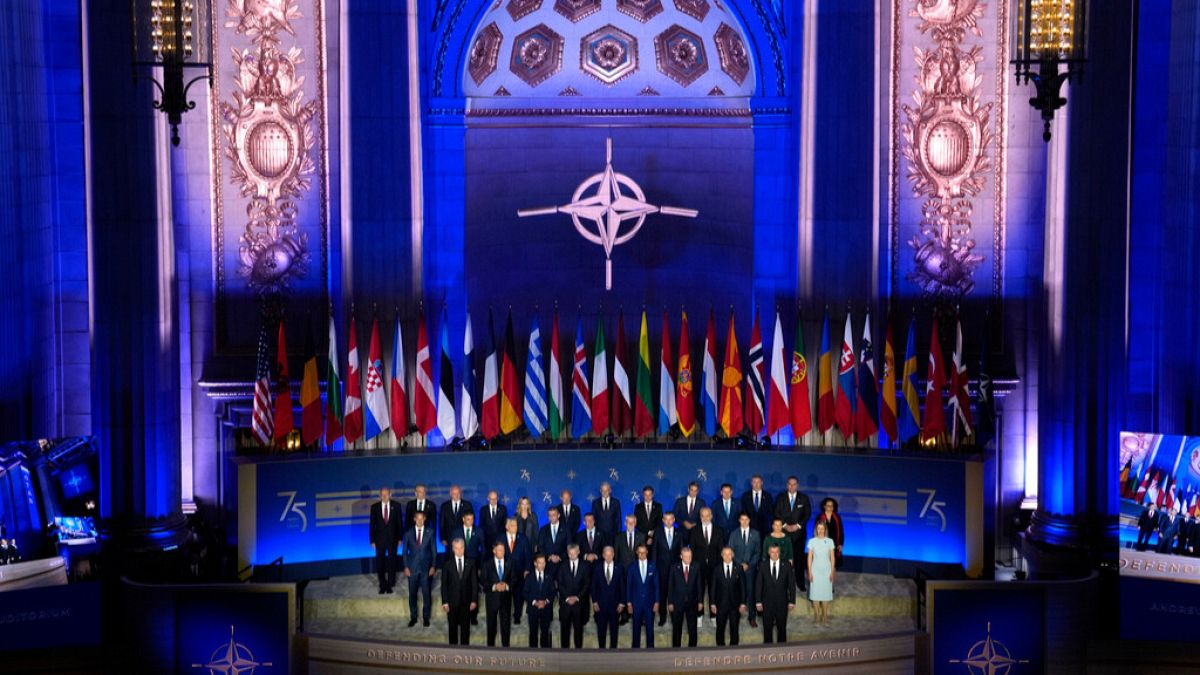The threat of Trump’s potential return to the White House has increasingly raised questions in Brussels about Washington’s continued commitment to the alliance.
As NATO’s anniversary summit in Washington kicked off, European leaders were quick to reiterate their increased spending for the alliance as the questions over the US’ changing presidency and Ukraine’s potential admission remain.
On the eve of the conference, EU foreign policy chief Josep Borrell noted that Europe had been increasing its contributions to the transatlantic alliance but did not hold back from questioning the US over its growing hesitance in helping out Ukraine.
“Allow me to remind you that the awakening of Europe — as much-needed as it is — should not imply that the US should rest easy,” Borrell said on Tuesday before adding that Washington’s deliberation over sending military support to Kyiv came “with a bill (to pay) in terms of human lives lost”.
Latvia’s President Edgars Rinkēvičs said, “there is a debate in the US that the US is doing a lot to support Ukraine and Europe is not doing enough. If you look at figures, it’s actually a different picture. Europe is doing more than the US.”
“We are taking security and defence seriously.”
The cutting remarks from European leaders came as the US prepares for an election in which incumbent President Joe Biden will run against the former president and known NATO-sceptic Donald Trump.
Biden has been straining to convince some members of his own party that he is the right candidate for the presidential race. Meanwhile, his reelection bid has been plagued with doubts surrounding his mental acuity following a disastrous debate in which many said he underperformed.
The threat of Trump’s potential return to the White House has increasingly raised questions in Brussels about Washington’s continued commitment to the alliance. Trump has previously been critical of the pact and its members, threatening to quit if other countries do not increase their spending.
In a campaign speech in February, Trump asserted that he would encourage Russia to do “whatever they want” to NATO members who did not meet their defence spending goals.
Confirmation that Europe was taking its contributions to NATO seriously was echoed by others during the start of the summit, who took to X to express their support for the alliance, including the recent nominee to replace Borrell in his role as EU High Representative, Kaja Kallas.
“We shouldn’t be afraid of our own strength,” Kallas pointed out.
Ukraine’s admission into the alliance
Elsewhere, countries tried to give assurances that Kyiv would eventually join the alliance — however, not until after Russia’s war in Ukraine was over.
US Secretary of State Antony Blinken said that Ukraine’s path to joining NATO is “irreversible” but fell short of committing to an actual timeline.
Outgoing NATO Secretary General Jens Stoltenberg echoed Blinken’s words, telling reporters on Wednesday that Ukraine will join NATO, but it was “too early to say when that will happen”.
A statement from the 32 allies this Wednesday is expected to further affirm the alliance’s commitment to Ukraine, following Ukrainian President Volodymyr Zelenskyy’s push for a clearly-worded guarantee that Ukraine can join the alliance.
However, some countries have opposed Ukraine’s membership, saying that it would open the risk for allies of the alliance to be drawn into a wider war.
“It is clear to everyone that Ukraine’s membership of NATO is still not a realistic option, as it would entail the risk of direct confrontation with Russia,” Hungarian Minister of Foreign Affairs Péter Szijjártó said.

